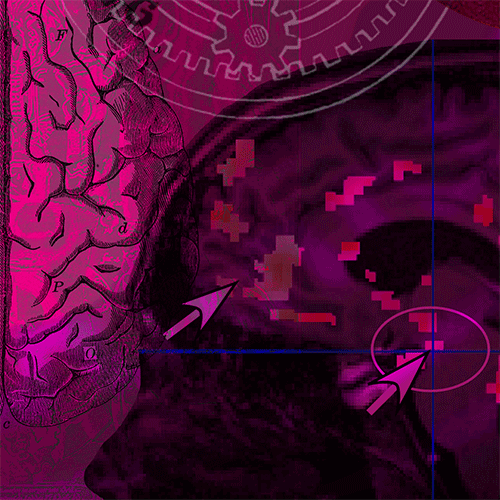
We look at brain scans of people who are madly in love. We talk with the neuroscientists who did the scans. And we talk with writer A.J. Jacobs, who compares his love for his wife to a ride on a Segway.
Researchers discover romantic love
Head to your local university library, and you’ll find shelves of books on courtship and marriage in history and literature, and even more books about sex. But scholarly books about love? Not so much.
If you want to read about love, you’ll find a lot more in the self-help section of the local bookstore. Books on why people fall in love with the people they fall in love with. Books on how to win love, how to keep love alive, and how to get over heartache.
These questions have fascinated the public for centuries, but only recently have they begun to seem like questions worthy of the attention of academic researchers. Historians, anthropologists, English literature professors, and even neuroscientists have started taking love seriously.
Neurologist Lucy Brown says when she started studying love in the mid 1990s, work like hers was uncommon. Studying love was seen by many scholars as trivial – or too difficult.
“It seemed kind of an amorphous thing, romantic love,” Brown says.
In fact, the first time Senator William Proxmire gave out one of his famous Golden Fleece Awards, bestowed on researchers he saw as wasting government money, it went to a scholar studying passionate love.
But that was back in the 1970s. Brown says love has gained respect.
“The attitude is changing tremendously, and there are more people studying it now,” she says. “This is now in the mainstream psychological literature that this is important to do.”

Neuroscientist Lucy Brown talks with TRBQ host Dean Olsher in her home office on City Island in the Bronx.
(Photo: Catherine Winter)
Brown is a professor of neurology at Albert Einstein College of Medicine. She uses an MRI machine to study the brains of people who are in love. She’s found that when people who are madly in love think of their sweethearts, many parts of the brain are activated, but one thing all her study subjects had in common was activation in a “primitive” part of the brain just above the brainstem.
“People who have just gotten a shot of cocaine show activation in this exact same region,” she says. “This passion is part of one of our deepest most important reward systems.”
She says this helps explain why love seems so addictive. And she says it supports her hypothesis: Romantic love is a drive, part of the human system for securing a mate. The other two parts of that system are lust and attachment love, which show up in different parts of the brain and, Brown and her colleagues argue, make people behave differently.
Brown’s research partner, Rutgers University anthropologist Helen Fisher, argues that the romantic love drive is even stronger than the sex drive.
“You know, if you ask somebody to go to bed with you and they say, ‘No thank you,’ you don’t kill yourself,” Fisher says. “But around the world people live for love, they pine for love, they kill for love, and they die for love – for a very important reason. It is with this person that you will form a pair bond and raise your children as a team and pass your DNA on into tomorrow.”

Anthropologist Helen Fisher says romantic love is a biological drive at least as powerful as the sex drive.
(Photo: Catherine Winter)
People around the world fall in love. That assertion of Fisher’s might seem logical today, but it used to be quite controversial. In fact, there are still scholars who believe that romantic love was invented by European troubadours in the Middle Ages, and that people outside of the western tradition don’t experience romantic love.
“We decided to see if that was true,” says anthropologist Ted Fischer, who teaches at Vanderbilt University.
In 1992, he and William Jankowiak, an anthropologist at the University of Nevada Las Vegas, co-authored an influential paper. They did a survey of anthropological research on 166 different cultures around the world.
“We looked for evidence of romantic love, and that could have been love poetry, or elopements, or just general descriptions of what we’d consider to be romantic love,” Fischer says. “And we found it in an overwhelming majority of cultures.”
Fischer says the few places where they didn’t find evidence of love, the anthropologists who did the original studies weren’t looking at factors like the ones he and Jankowiak were looking for. So elopements or love-related suicides might have occurred and just not been noted.
“So we thought it’s very likely romantic love is found in all cultures,” he says.
Jankowiak and Fischer defined romantic love like this: “an intense attraction that involves the idealization of the other person, the beloved, in an erotic context but with the expectation of enduring into the future, so not a momentary lustful infatuation.”
Jankowiak says by that definition you can’t be in love with two people at once. He has studied polygamous cultures, and he believes even when a man is supposed to love all of his wives equally, he can’t do it. There’s always a secret favorite. Jankowiak calls this “illicit monogamy.”
Jankowiak and Fischer’s paper made a big splash, and today it’s widely accepted that people in cultures outside of the west experience romantic love.
But perhaps not all romantic love is the same.
“When you look at cross-cultural research of romantic relationships, you get these very striking cultural differences,” says Xiaomeng (Mona) Xu, a psychology professor at Idaho State University.
For example, people in some Asian countries tend to describe love in more negative terms than westerners do. In countries with a tradition of arranged marriage, falling in love is disruptive and dangerous. Falling in love is arguably about pleasing yourself, and some cultures put more emphasis than westerners do on serving your family or your community.
When asked about love, many people in China will talk about duty and responsibility, rather than Hollywood-style romance.
“The sorts of cross cultural differences that come out of self-report questionnaires would suggest that easterners for example really don’t feel passion, really don’t think about love as a positive thing,” Xu says.
“It’s very pragmatic,” Xu says. “It’s based on thinking about whether or not this person is going to fit into your family and if they’re going to be a good financial choice, etc.”
And yet there is love poetry in China, and songs about love that show deep passion. Xu says the surveys don’t ring true.
“The issue is that all of these studies are done using self report,” Xu says. “So it’s really difficult to know: Are people accurately reporting their experiences and there’s this drastic difference between how westerners experience love and how easterners experience love, or is it that culture is influencing how people talk about it?”
Xu headed the first study to look at the brains of Chinese people who were in love and compare their brain scans with those of people in the US and England.
“We found that they’re almost identical,” she says.
Xu says what differences they found may just have been because her team was using a stronger scanner than earlier studies had used.
This research provides support for what Xu had guessed was the truth: that “how we go through process of love can be very culturally defined” but the “actual experience” of love is not so different from culture to culture.
Xu and her colleagues say that love research is still in its early stages, and there are many more questions. They want to know more about how romantic love differs from love for children, or love for pets. And they’d like to know whether animals experience something like human love.
Xu says some researchers are training dogs to sit still in a scanner. The problem is, you can take a scan of a dog’s brain, but it’s hard to know what the dog was thinking about at the time.
* * *
Lucy Brown and Helen Fisher also studied brain scans of people in China. Here’s a short video they made explaining their findings about love in China.
MORE AUDIO from TRBQ:
TRBQ Podcast #2 — Love in Shanghai
Subscribe the to the TRBQ podcast on iTunes.
Listen to the TRBQ podcast on Stitcher.
Follow TRBQ on SoundCloud.






